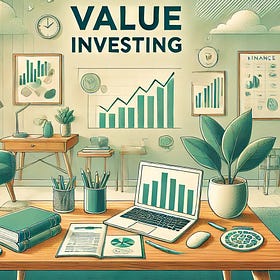Lesson 12: Mr. Market
Value investing 101
Mr. Market is a fictional character created by Benjamin Graham in The Intelligent Investor.
This is how Warren Buffett described Graham’s Mr. Market character in his 1987 letter to shareholders:
Ben Graham, my friend and teacher, long ago described the mental attitude toward market fluctuations that I believe is most conducive to investment success. He said that you should imagine market quotations as coming from a remarkably accommodating fellow named Mr. Market, who is your partner in a private business. Without fail, Mr. Market appears daily and names a price at which he will either buy your interest or sell you his.
Even though the business that the two of you own may have stable economic characteristics, Mr. Market's quotations will be anything but stable. Sad to say, the poor fellow has incurable emotional problems. At times he feels euphoric and can see only the favorable factors affecting the business. When in that mood, he names a very high buy-sell price because he fears you will snap up his interest and rob him of imminent gains. At other times, he is depressed and sees nothing but trouble ahead for both the business and the world. On these occasions, he names a very low price, terrified that you will unload your interest on him.
Mr. Market has another endearing characteristic: he doesn’t mind being ignored. If his quotation is uninteresting to you today, he will be back with a new one tomorrow. Transactions are strictly at your option. Under these conditions, the more manic-depressive his behavior, the better for you.
But, like Cinderella at the ball, you must heed one warning, or everything will turn into pumpkins and mice: Mr. Market is there to serve you, not to guide you. It is his pocketbook, not his wisdom, that you will find useful. If he shows up some day in a particularly foolish mood, you are free to either ignore him or take advantage of him. However, it will be disastrous if you fall under his influence. Indeed, if you aren’t certain that you understand and can value your business far better than Mr. Market, you don’t belong in the game. As they say in poker, "If you've been in the game 30 minutes and you don't know who the patsy is, you're the patsy."
Ben’s Mr. Market allegory may seem out-of-date in today's investment world, where most professionals and academicians talk of efficient markets, dynamic hedging, and betas. Their interest in such matters is understandable, since techniques shrouded in mystery clearly have value to the purveyor of investment advice. After all, what witch doctor has ever achieved fame and fortune by simply advising, "Take two aspirins"?
The value of market esoterica to the consumer of investment advice is a different story. In my opinion, investment success will not be produced by arcane formulas, computer programs, or signals flashed by the price behavior of stocks and markets. Rather, an investor will succeed by coupling good business judgment with an ability to insulate his thoughts and behavior from the super-contagious emotions that swirl about the marketplace. In my own efforts to stay insulated, I have found it highly useful to keep Ben’s Mr. Market concept firmly in mind.
I couldn’t put it better than Buffett himself.
Lessons from Mr. Market
"Mr. Market is there to serve you, not to guide you."
— Warren Buffett
Don't get swept away by his moods. Instead, use his emotional swings to your advantage:
Sell when he offers irrationally high prices.
Buy when he offers irrationally low prices.
Your own valuation of a company should be the foundation of your decisions — not Mr. Market’s mood of the day.
The Market is Not a Scale — It’s a Voting Machine
Benjamin Graham emphasized:
"The stock market is not an exact scale that measures the true value of businesses. It is a voting machine where emotions and reason collide."
The prices you see in the market are often more emotion than rational calculation.
How to Use Mr. Market Wisely
✅ Make your own estimate of a company's intrinsic value.
✅ React rationally: buy at irrationally low prices, sell at irrationally high prices.
✅ Ignore Mr. Market if his offer doesn’t make sense.
✅ Stay calm when the market is swept by panic or euphoria.
As Buffett puts it:
"Investment success comes not from secret formulas or market signals, but from common sense and emotional discipline."
Value Investing 101: beginner friendly course
In the current market situation, I believe it's time to create an introductory series on value investing—a method that focuses on buying businesses at a price lower than their true value.



